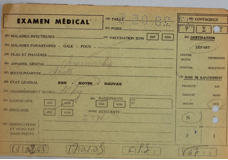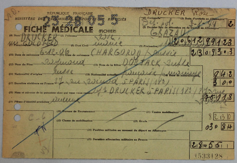Dobrisch DRUCKER
Dobrisch Rose Drucker, née Goldfeld, was born on December 6, 1906 in Chargorod, Russia. Her parents were Baila Doubjack and Haïm Goldfeld, both of whom were Russian[1]. We do not know when the Goldfeld family moved to France, but Dobrisch became a French citizen when she married Jacques Drucker in Paris on October 27, 1932. Jacques was born in the 18th district of Paris on November 26, 1901, and became a French citizen on June 11, 1915, when he made a declaration before the Justice of the Peace of the 17th district[2]. After they were married, the couple moved in with her parents, who lived at 47 rue Boinod in the 18th district of Paris. It was there that their two children were born, Raymond on June 23, 1933, and Maurice Raoul on January 21, 1936. Dobrisch was working as a shorthand typist at the time[3].
The family then moved to 37 rue Boinod. At least, this is the address listed in the Paris Police Headquarters register when Dobrisch was arrested on July 23, 1944. The register also gives the reason for the arrest as “Jewish”, and the authorities responsible for it as “Jewish affairs”[4]. Dobrisch later confirmed that she was arrested by German Gestapo agents shortly after they captured her husband on rue Ordener[5]. Two witnesses, Jean Guillaumeau and Gaston Baubion, testified to this version of events[6]. Dobrisch was taken to Drancy camp the following day and then deported to Auschwitz on July 31, 1944[7]. She arrived there on August 3, 1944[8].
Dobrisch Drucker was later transferred from Auschwitz to the women’s labor camp in Kratzau (now in the Czech Republic), where she was liberated by the Russian army on May 8, 1945. She was repatriated to the Saint-Avold reception center on the French-German border on May 28, 1945, twenty days after the Allies’ victory over Nazi Germany[9]. The report on her medical exam, which was carried out when she was repatriated, notes that her overall state of health had deteriorated significantly and that she had lost around 22 pounds in weight[10].
When she arrived back in France, Dobrisch moved back to 37 rue Boinod with her two children, and began a series of applications to the relevant authorities. She first asked if there was any news of her husband, who had in fact died in the Struthof camp on November 25 1944[11], and then on December 15, 1952, requested that he be granted the status of “déporté politique”, or “political deportee (meaning that he had been deported for political reasons). She said she was an assistant social worker at the time[12]. The French authorities granted her request on December 20, 1954[13]. As a result, in May 1955, the French government sent her a check for 12,000 francs[14]. She also had her two children made wards of the State[15].
Dobrisch Drucker’s medical examination report (DR1D751 et DR17991)
Aside from the Paris Police Headquarters arrest register (DRUCKER-Dobrisch-APP_CC2-9), the students worked mainly on a large dossier from the Victims of Contemporary Conflicts Archives Division of the French Defense Historical Service in Caen, Normandy. This appears to have been compiled mainly from documents that Dobrisch Drucker herself gathered together after she returned to France in order to have Jacques’ status as a “political deportee” recognized by the French authorities. The main limitation of this collection is the very short period it covers: primarily the arrest and deportation. In some cases, the records reveal contradictions between the details that Dobrisch provided and those compiled by the French authorities. There are also some gaps in the documentation. Nevertheless, this research enabled us to identify Jacques’ specific deportation route, from Auschwitz to Struthof, and to highlight the complexity of the administrative challenges that victims faced as they sought to have their status acknowledged and to assert their legal rights.
Sources
[1] Report from the General Information Department for the French Ministry of Veterans’ Affairs and Victims of War (DR1F0C1); Medical examination report – front (DR17991).
[2] Certificate of nationality (DR15031).
[3] Raymond and Maurice Raoul Drucker’s birth certificates (DAVCC36) and (DAVCC37).
[4] Paris Police headquarters register (DRUCKER-Dobrisch-APP_CC2-9).
[5] Report from the General Information Department for the French Ministry of Veterans’ Affairs and Victims of War (DR1F0C1).
[6] Arrest statements (DR3BA81).
[7] Request for official information (DR9D201); Deportation certificate (DR41A21); Application for the status of political deportee – page 3 (DRUCKE4).
[8] Medical examination report – front (DR17991).
[9] Deportation certificate (DR41A21); Request for official information (DR9D201).
[10] Medical exam report – back (DR1D751)
[11] See the biography of Jacques Drucker.
[12] Application for the status of political deportee – pages 1 and 5 (DRUCKE2; DRED0E1)
[13] Application for the status of political deportee – page 6 (DR46011); Granting of “political deportee” status (DR5FA11).
[14] Checklist for the payment of compensation to the beneficiaries of deceased political deportees (DRC4A61).
[15] Raymond and Maurice Raoul Drucker’s birth certificates.


 Français
Français Polski
Polski










